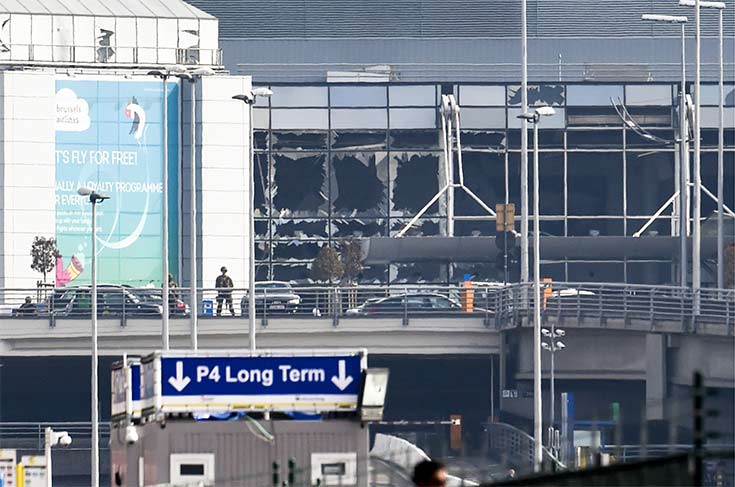Communities can help to defeat terrorism
Communities have a role to play in keeping where they live safe by reporting suspicious activity, says Roger Gomm

Terrorist attacks such as those on Brussels Airport and underground system, and the recent attack in Pakistan, require planning and reconnaissance; people can help to foil them by being aware of suspicious activity within their communities (Isopix / Rex / Shutterstock)
The media strap line and public advice in the UK during the IRA campaigns was: “Communities defeat terrorism.” I believe that this remains true today, but it appears that we have become fatalistic: all efforts and media reporting seem to be focused on preparing for and responding to an expected attack.
The events that took place in Belgium, Paris, Turkey, Tunisia and Pakistan will have shocked everybody: these are brutal and senseless attacks on civilians that send a global message. The criminal terrorists try to strike at the strong where it hurts most, by mounting or threatening attacks against civilians and civil infrastructure.
The British security services and the police that work alongside them have done a magnificent job in identifying and preventing such attacks. But it only takes one to succeed and the focus will be on those responsible for preventing such outrages at every level.
The current threat of a malicious terrorist attack to the UK is real and serious. The aim of the Government’s counter terrorism strategy, Contest, is to reduce the risk to the UK so that people can go about their lives freely and with confidence. Everyone has a role to play in supporting the aim of Contest.
The simple answer is there are numerous individuals of concern in the UK’s cities and it is impossible for them all to be monitored by the police and intelligence agencies. The UK would resemble a police state if that were the case. But the question that must be asked is: ‘Are we part of the problem?’
There are several well-known British traits, which I would suggest have no place in this new environment of terrorist threat. In order to strengthen community engagement and resilience, we must overcome the attitudes of: Don't get involved; Not our concern; and Mind your own business.
Terrorists have a lot of work to do before they attack. They need to plan and prepare; buy and store materials; and fund their activities. Terrorists live within our communities and blend in among law abiding and peaceful citizens. However, behind closed doors they may be storing bomb making materials or meeting others to plan attacks. It is time for those who are suspicious of a property where there is unusual activity or strange comings and goings that don't fit day-to-day life to voice their concerns.
We can do this by remaining vigilant and reporting any suspicious activity. Suspicious activity can include:
-
Someone behaving differently for no obvious reason;
-
Someone with passports or other documents in different names for no obvious reasons;
-
Someone who travels for long periods of time but is vague about where they’re going;
-
Someone buying or storing large amounts of chemicals for no obvious reasons;
-
Someone who visits or sends out links to extremist websites; and
-
Someone who is recording and documenting information in a crowded location – remember that the attackers will carry out observation and surveillance to plan attacks.
If communities and individuals are aware of any of the above, have seen somebody taking pictures of security arrangements or know of activity at a property that does not fit normal day-to-day life, they should report it. Many countries have websites or phone hotlines for such reporting. For example, in Pakistan, the number to call is 1717; Turkey has launched a counter terror website and, in the UK, a freephone number (0800 789 321) was introduced several years ago.
Roger Gomm, 28/03/2016